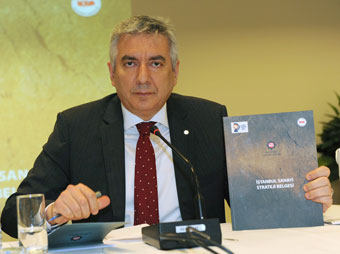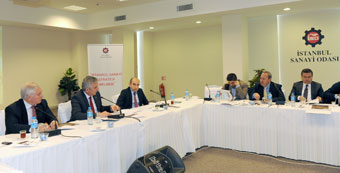News
ICI Chairman Bahçıvan Announces “Istanbul Industrial Strategy Document”
- 24.02.2015
- News

Istanbul Chamber of Industry (ICI) announced the “Istanbul Industrial Strategy Document” prepared in cooperation with Istanbul Development Agency following a year of extensive studies. The document is the first of its kind in urban industrial strategy in Türkiye and has achieved consensus by the industrialists of Istanbul, encompassing 46 strategies and 85 action plans under 18 titles.
Istanbul Chamber of Industry (ICI) announced the industrial road map of Istanbul, the flagship city of Türkiye on its road to becoming one of the top 10 economies of the world by 2023. The document prepared by ICI in cooperation with Istanbul Development Agency is the first of its kind in terms of urban industrial strategy in Türkiye. “Istanbul Industrial Strategy Document” reveals that unless the industrial strategies of the city are given attention, it will be impossible for Türkiye to reach the goal of 500 billion dollar export volume in 2023.
As a result of a year-long extensive studies, Istanbul Industrial Strategy Document lists 46 strategies and 85 action plans under 18 titles. The Strategy Document is the product of one-to-one interviews with companies in ICI’s 46 sectoral committees, focus group meetings, questionnaires as well as analyses of all data and documents including reports, articles and books that would have an effect in the development of industrial strategy.
Istanbul’s current landscape and future vision identified
Erdal Bahçıvan, Chairman of the Board of Directors of ICI, announced the Istanbul Industrial Strategy Document at a press conference today during which he stated that the document was the first response from the business world to government’s announcement of the Priority Transformation Programs in the Economy, a desire expressed by Premier Davutoğlu as well. Bahçıvan emphasized the importance of the document to draw consensus from the industrialists of Istanbul, which covers the current landscape of Istanbul and its industry as well as fundamental strategies and actions to adopt for the future vision of the city.
Bahçıvan added in his remarks that industry was excluded in the discourse on the future vision of Istanbul. He continued his speech as follows: “Yet Istanbul is the jugular of the national economy as the center of industrial manufacturing. 24% of GDP, 52% of exports and 56% of imports are carried out in Istanbul. The city gives access to markets of 1.5 billion people with a simple four-hour flight. Approaches that are at odds with these facts will bring further down the share of our industry in the national income, which has already dropped as low as to 15%. Therefore, Istanbul must absolutely develop as an industrial city with necessary measures taken so that it acquires an established structure. The organized industrial zones are the first place to look at to achieve this end.”
No goals can be attained without consideration of Istanbul’s strategies

Bahçıvan stated that the research revealed the indispensible bond between Türkiye’s export vision and Istanbul. His remarks were as follows, “Figures show us that Istanbul plays a substantial leading role in Türkiye’s exports. Almost the entirety of Istanbul’s exports is made up of industrial products. Istanbul made 42.6% of Türkiye’s total exports in 2004 with the rate declining to 37.5% in 2013. It may be assumed that the rate would drop to 32.5% in the following decade. 32.5% of Türkiye’s exports goal for 2023 is equivalent to 162.5 billion dollars. Even the most conservative approach estimates that Istanbul will be responsible for 160 billion dollars of exports in 2023. It would therefore be impossible to attain the goals set for 2023 without taking into consideration strategies of Istanbul that covers up a large share of Türkiye’s exports.
Bahçıvan emphasized that the increase in Istanbul’s current export capacity is not sufficient to achieve the 160 billion dollar export goal with additional effort required to raise the rate of high value-added and high-technology production in exports. His remarks were as follows, “Istanbul has the only infrastructure that can raise high-technology based exports in Türkiye in a brief amount of time, which makes up more than two thirds of Türkiye’s high-technology product exports.”
Istanbul is “medium level competitive” according to diamond analysis
In his remarks on the preparation process of the Strategy Document, Bahçıvan stated that they initially identified Istanbul’s current position with the aid of the Diamond Model analysis developed by the world-renowned business management expert Michael Porter to determine the level of competitiveness. According to the results of the analysis, Istanbul’s industrial sector was found ‘medium-level competitive’. Bahçıvan commented on the finding as follows: “The medium-level competitiveness of Istanbul’s Industry indicates an uncertainty as regards whether industry will be of great import for the city in the future as it has been so far. If local governments continue efforts to push industry outside the city and the central government continues to give no support for Istanbul’s Industry and if industrial enterprises in Istanbul fail to improve institutionalization and R&D infrastructure, it will be unfortunately inevitable for these enterprises to lag behind global competition.”
Geographical location is great advantage while university-industry cooperation is weak

Bahçıvan pointed out the strengths and weaknesses of Istanbul and its industry: “Our strengths include our geographical location, presence of industrial entrepreneurs, 50 universities, development level of the supply chain, external and internal market, consumer awareness level, geographical concentration, manufacturing structures of companies and the presence of foreign-invested companies. By contrast; results showed unsatisfactory medium and low levels in establishment of industry, cooperation between universities and the industry, employment of newly-graduates in the industry, R&D, supply of raw materials and semi-finished products, logistic infrastructure, access to finances, incentives, local governments, branding and institutionalization of companies.”
Document will make Istanbul a highly competitive city
Following are the “18 strategy titles” to undertake to turn Istanbul to a highly-competitive city and to achieve the goals of exports set for 2023, as announced by Erdal Bahçıvan, Chairman of ICI.
1-Development of Human Resources Level in the Industrial Sector of Istanbul
According to industrialists, sectors in Istanbul can find qualified human resources at the lowest rate of 23 per cent. Thousands of students graduate from nearly 50 universities in Istanbul each year and prefer sectors other than the industrial sector.
2-Development of R&D Capacity of the Industrial Sector of Istanbul
Istanbul is the leader in R&D activities in Türkiye. On average; half of patent, utility model and industrial design registrations in Türkiye are obtained in Istanbul. The number of patent registrations in Türkiye points out the fact the R&D system in Istanbul does produce outputs.
3-Development of Cooperation Between Universities in Istanbul and the Industry
It is a significant advantage for the industry to be in a city with nearly 50 universities. However, cooperation between universities and the industry is far below the desired level, despite the industrial platform created by ICI with seven universities.
4-Harmonization of Industrial Settlements with the Goals of Türkiye and Istanbul Set for 2023
There are uncertainties regarding the location of industrial manufacturing, which poses a setback for new investments and therefore negatively affects the competitiveness of companies.
5-Development of Innovation Infrastructure and Awareness in the Industrial Sector of Istanbul
Istanbul needs to build an infrastructure to carry out innovation as a lifestyle. Representatives of the industrial sector should develop a habit of engaging in innovation as a part of their daily life.
6-Development of an Awareness to Obtain and Protect Intellectual Property in Industrial Enterprises in Istanbul and Establishment of a Legal System
7-Development of Cooperation Between Sectors in Istanbul
There are numerous developed industrial and service sectors in Istanbul. Attention should be given to establish cooperation between these sectors and build and consolidate win-win models.
8-Establishment of the Optimum Logistic Infrastructure for the Industrial Sector of Istanbul

Istanbul has a major geostrategic advantage, which requires industrial enterprises of Istanbul to train their exports personnel on export logistics. An infrastructure should be established to minimize logistic expenditures, which is enabled by a fully-integrated logistics approach.
9-Development of Branding Capacities of Industrial Enterprises in Istanbul
The industry in Istanbul has a very low number of brands that are recognized worldwide. Becoming a well-known brand in the global market is important to attain higher levels of profit margin. Recently, public funds are given to serve this aim but the sector finds these funds insufficient.
10-Development of Industry Clusters in Istanbul
Industrial sectors have a highly-developed clustering structure which enables more efficient and effective work. Istanbul now has medium and high technology sector clusters as well.
11-Sufficient Information Provided to Public Institutions on the Industry of Istanbul
The industry in Istanbul has many stakeholders. Periodical negotiations should be held between all institutions, from the Istanbul Metropolitan Municipality to the Treasury, Ministries of Economy and Industry and Technology. Mutual information should be exchanged between these institutions on a regular basis.
12-Establishment of Close Cooperation Between NGO’s in the Industries of Istanbul
NGOs working under the auspices of the industrial sectors in Istanbul should be consolidated. Regular meetings should be held between sectoral associations. Efforts should be made to integrate these NGOs into international networks.
13-Improvement of Institutionalization in the Companies of the Industrial Sector of Istanbul
Companies in the industrial sector of Istanbul should raise their levels of institutionalization. Training of ICI members on institutionalization has been set as a fundamental objective. Another goal is to create a counseling pool to meet the needs of institutionalization.
14-Development of Design Capacities of Industrial Manufacturing Companies in Istanbul
The design capacity of the industry of Istanbul should be developed. Industrial enterprises in Istanbul should increase cooperation between departments of design in universities.
15-Facilitation of Proper Funding for Companies in the Industrial Sector of Istanbul
Türkiye has a low level of savings with limited industrial financing provided by banks compared to developed economies. This situation in turn renders loans expensive for industrials and brings mortgage and similar additional costs in loan usage. Industrialists use approximately half of their profits to cover the financing costs. 12% of enterprises has easy access to financial resources while the remaining 88% has low to medium levels of access.
16-Improvement of Use of New Technologies in Industrial Manufacturing in Istanbul
Awareness should be raised for industrial enterprises in Istanbul to manufacture with high technology. The latest developments in manufacturing should be shared through regular training sessions. Incentives should be given for high-technology manufacturing. Increased support should be given to industrial enterprises that wish to benefit from technological innovations in manufacturing.
17-Generalization of Environmentally-Conscious Manufacturing as a Natural Component of the Industry of Istanbul
Industrial enterprises should be more environmentally-conscious. In addition to legal requirements, they should receive feedback and should be encouraged to improve themselves. Training sessions should be organized to develop awareness in minimized water use and industrial waste.
18-Improving the Number of Rising, Successful Global Companies within the Industrial Sector of Istanbul
Efforts should be made to have global companies emerge from Istanbul. Higher cooperation should be established with the involvement of industrialists to share the experiences of world-famous industrial companies based in Istanbul.